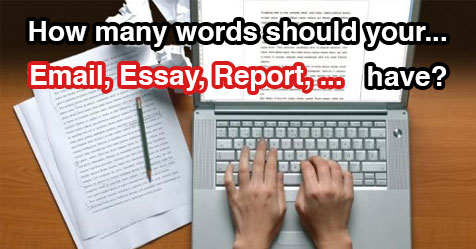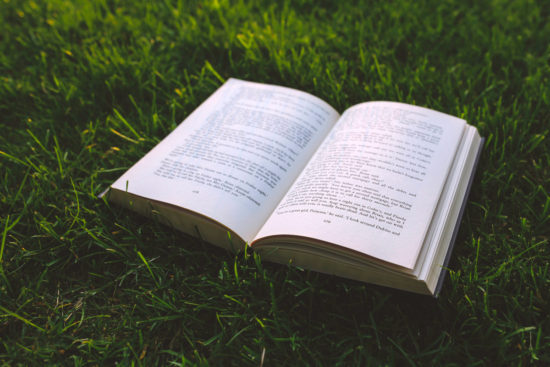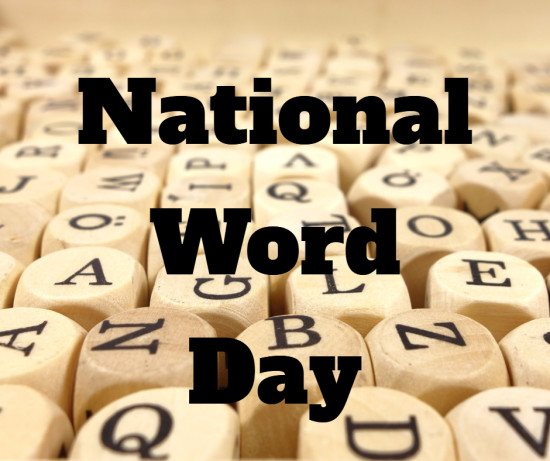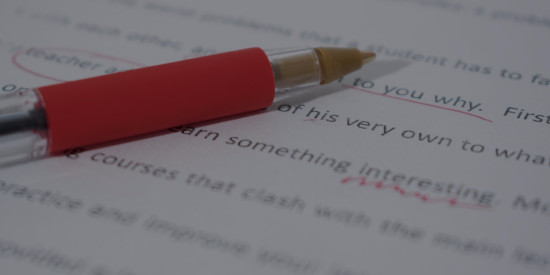Author: admin
Word Count List – How Many Words Your Text Should Have

Think word count isn’t important in writing? Well, think again. As a writer, the number of words in a piece matters a great deal; it is the only measure of productivity you have. Therefore, you need to ensure the number is within what’s expected for your genre and category. So how many words should your text have? Let’s take a comprehensive look at our word count list, and find out how it all works.
A good average sentence length
There’s no perfect length, however, a well-written sentence should have 15-20 words on average. Using simple and short sentences will help more people to understand your content. But restrain from using uniform sentence lengths if you don’t want your writings to be choppy and without flow.
Though there’s the possibility of long structured sentences being balanced and readable, comprehension often drops and readers may struggle to understand the whole content. People expect you to get to the point, especially your busiest readers. They don’t have the time to slow down to deconstruct the long, complicated sentences and contemplate the clauses. By making it simple, it shows you respect your content reader’s time and interest.
How many words in a paragraph?
As you can expect, there is no fixed number of words that a paragraph should have. A rule of thumb: the paragraphs are usually about 100 to 200 words long, which is about 6-8 sentences. Nevertheless, it all depends on the ideas, and ideas come in many sizes. So the paragraph can be long enough to reach its end. But we can’t ignore the fact that readers don’t like seeing blocks of paragraphs. And it’s for that reason you should stick to one concept or idea per paragraph to avoid creating very long paragraphs. Simply shift to a new paragraph when you shift to a new concept/idea.
How many words in an essay?
A standard essay must be a minimum of 3-5 paragraphs, but if you’re not instructed to write the given paragraphs, there’s no point sticking to this extremely limiting rule. This is handy in academic writing, where your paragraphs are expected to be longer than most essays. On average, there are 100 to 200 words in a paragraph. And as a general rule with essays, you’ll have an introduction, body, and conclusion. So you can assume that a 1500-word essay will likely to have about 5-8 paragraphs. Remember your essay will be evaluated on the content you present, not the number of paragraphs.
How long should a book be?
Though the length of your book is determined by the details needed to make it good, it is important to adhere to the expected word count in your genre and category. It demonstrates how well you understand your market. And in line with this, here are the industry norms worth knowing.
- Under 500 words is generally considered flash fiction
- A short story: 1,000-8,000 words
- Novella Story: 10,000-40,000 words
Novel
A 40,000-word manuscript can be considered to be a novel, but to be eligible for finisher status, you’re required to write a minimum of 50,000 words. The maximum word is generally 60,000-100,000 words.
Sci-Fi and Fantasy Books
There is no rule on the word limit regarding science and fantasy fiction books. However, most of the books usually fall within the 90,000-120,000 words. The publisher and agents are more lenient on word limits for this genre; therefore, you’re not likely to lose out on a deal if you exceeded the number of words. You may be wondering why the books in this category are an exception. Well, reading epic novels of this genre are interesting and require the audience to take some time to create the fantasy world around them, and then imagine themselves in it.
Adult Novels
The generally recommended words usually fall between 80,000 and 100,000. If your manuscript is over 100,000 words, publishing it could prove to be more expensive.
Children Novels
The word length for children novels is not set in stone, but even so, its likely to be around 20,000 to 40,000 words.
What is the average word count for an email?
According to a study conducted by Email Labs, people spend about 15-20 seconds reading an email. Sending the readers lengthy email messages may make them feel overwhelmed, and might not read through it. Now, you may be tempted to ask, “what’s the right number of words for an email? “ Well, it all depends on the ideas or information you want to deliver. A rule of thumb: the shorter message, the better. Always try to limit your email to around 300 words or less. If your email message needs to be longer, it’s absolutely okay. However, focus on the main message, eliminate the distractions, and keep the content easy to scan.
How many words should your report have?
There’s no set minimum or maximum, regardless of the type of report. If you’d like a guesstimate, just assume the audience will take around 10-20 minutes reading the report. And on average, your readers can read 1 double-spaced page or 250 words in a minute. In 10 minutes they would have read about 2,500-4,500 words. But that’s just an approximation.
Remember a few people read an entire report, so keep it simple and not too long.
How many words should your application have?
Whether you are applying for a job or college, it’s extremely important to keep in mind that there’ll be a long list of applicants. When you present a very long resume, you’re simply scaring off the person who’ll be reading it. Don’t forget he/she has other applications to review. Even if you were to be more qualified, there’s a great possibility of wasting your chances. So if you are not instructed to write within a certain word limit, just make sure your application is short as possible, typically less than 500 words.
How long should your motivational letters be?
While there are no exceptions, your letter of motivation shouldn’t be longer than one page. Make it around 300-500 words. It is crucial to keep it shorter, but make sure you highlight your most relevant qualifications and what you have to offer.
If you want to check your word and character count, improve writing style and word choice online, bookmark our online editor.
How Many Words in a Novel Chapter?

You’re writing your first novel, and you know you must shoot for around 80 to 95 thousand words. Once you know what your book will be about, it’s time to start planning the structure of the story. What will happen in each chapter, and how much has to happen before you move on to the next chapter? How many chapters will you need before you reach your target word count?
It’s Up to You – Within Reason
Before you decide your average chapter length, it’s a good idea to think about the purpose behind dividing a book into chapters. Think of it as a TV series or a play. Each chapter will consist of one or more scenes that contribute to the development of the story.
Unlike TV series, you aren’t limited to a certain amount of airtime, so some important scenes may require longer chapters. The important thing is to end each chapter at the end of a scene, allowing your reader to save the next “episode” for another time.
However, it doesn’t make much sense to have one chapter that takes up a major part of the book while other chapters are much shorter. Admittedly, some published authors have done just that, but your readers may find it a little odd.
Your audience may also play a role. For example, books for the youth market often have shorter chapters than those intended for adult readers. Again, it isn’t a rule, but if you’re writing for people with a short attention span, shorter chapters make sense.
How Long Are the Chapters in Books by Famous Authors?
Looking at what successful authors have done in the past is always a help. That’s why writers should always be readers too. Best-selling books show us what the public likes, and of course, we’re hoping that our own novels will be liked by the public. Let’s look at some chapter lengths, but remember that these are averages. In any of these books, some chapters are longer than others.
- Harry Potter and the Sorcerer’s Stone has an average of 4,560 words per chapter.
- Twilight uses about 4,580 words per chapter.
- The Hunger Games uses 3,700-word chapters, dividing each chapter into three parts.
What Do Most Writers See as a Good Average Chapter Length?
The debate is ongoing. Some will tell you 2,500 words is the average, while others will say that 3,000 to 5,000 word chapters are more likely to be the norm. Most agree that under 1,000 words would be rather short and that over 5,000 might be rather too long. As a general guideline, chapters should be between 3,000 to 5,000 words.
All of them agree that the chapter length should be defined by the story and that any chapter length targets you decide on are merely guidelines. Most of them say that trying to keep the chapters within a certain length range is helpful to the reader.
Chapter Length Rule 1: There Are No Rules
Writers sometimes use extra-short chapters such as ones that are a sentence or two long for emphasis. The element of surprise at finding a chapter that consists of a sentence, or even just a word, will make readers sit up and take note. However, use this technique sparingly. It loses its effect if you regularly do it.
There’s also no real rule that says a chapter can’t be longer than 5,000 words. Daniel Defoe wrote the book Moll Flanders without dividing it into chapters at all, so in theory, you could say that the entire book consisted of just one chapter. However, as a new author, I’m not sure you would get away with that.
It’s the Story That Matters Most
Trying to pad out an uneventful chapter with thoughts or events that don’t contribute to your plot will bore your readers leaving them with the impression you’re waffling. Compressing a very exciting scene so you can meet your chapter word count target is also not going to do you any favors.
While the idea of chapters in the 3,000 to 5,000-word range is a good guideline when roughing out your book’s structure, it isn’t a rule, and the story itself should be the primary deciding factor. Build your plot through a series of events or scenes. Then decide for yourself where the chapter divisions will be. You may decide to include two or more scenes in a chapter, or you might stick to one scene per chapter. Just ensure that the division comes at a time when a reader could put the book down if they want a break. Of course, if you keep it exciting enough, your reader will want to know what will happen next, and might have trouble putting the book down at all.
Words Everyone Seems to Hate

A Lot of People Hate the Word “Moist”
Paul Thibodeau, a psychology professor, authored a study based on the way 2,500 people reacted to words, and “moist” was generally considered to be downright nasty. It’s possible the reaction would have been different if he included it in a phrase like “moist chocolate cake,” but when viewed on its own, it was seen as being absolutely disgusting by 25 percent of the group.
Words using similar sounds didn’t get the thumbs down. People felt relatively neutral about “hoist,” for example. So, what’s the problem with “moist?”
Professor Thibodeau thinks it may be the association between “moist” and bodily functions. “Vomit” and “phlegm” were also rated as being among the most-hated, so he joined the dots and decided that words related to bodily fluids were the pits.
A Linguistics Professor and a Neurologist Blame Sounds
Professor Jason Riggle and Dr. David Eagleman, a neuroscientist, think that word aversion comes from the sounds themselves. Just as we feel odd after hearing a jarring sound in music, certain word-sounds are unpleasant to us. Dr. Eagleman has done his own experiments using made-up words and found that people didn’t like unusual sound combinations. So, if we think a word sounds funny, we’re more likely to associate it with something unpleasant.
Associations or Sounds: Who Is Right?
I’m going to sit on the fence with this one. Associations really can make a word disgusting. Take “vomit” for example. The very thought of vomiting is stomach-churning. The word itself is probably innocent enough, but the association is utterly gross!
At the same time, I can believe that sounds that don’t fit our ideas of harmony would also be jarring. Unlike Dr. Eagleman, I’ve never invented a truly disgusting word, and I wouldn’t know where to begin, but it makes sense in a way.
I’d say both reasons for being disgusted by words are valid. What do you think?
Is This Useful Knowledge?
Oddly enough, I think this knowledge could be useful, particularly in the marketing world. When we send out marketing messages, we need to be very careful in our word choices. We might even want to disgust our audience before offering them a calming, soothing message that explains how to solve a problem. Alternatively, we might want to avoid any negative associations whatsoever.
Still, just because of chocolate cake, I’m not altogether convinced about the gut-churning effects of the word “moist.” Couple it with cake, and suddenly, it sounds very, very yummy. Is it just me who thinks so? Of course, being covered with moist sweat sounds a whole lot less delicious, so I think we need to add context before we can talk about word aversion.
Made-up words are two-a-penny. Just look at company names and brand names, and you’re sure to find at least a few invented words. If we could know what sounds or combinations of sounds give people that “Eeeyew!” feeling of disgust, and which ones make them feel great, it could surely help companies with their branding strategies.
Is It OK to Hate Words?
I’ve read commentary about how silly it is to hate words, but whether it’s silly or not, it seems to be a real enough phenomenon. But to play devil’s advocate, we need negative words as much as we need positive ones. After all, if you want to describe something gross, having some unpleasant-sounding words or ones with less-than-charming associations, is mighty handy!
I use “vomit” quite often, “I went into the exam room, vomited out a whole lot of information, and scored an A!” The word “regurgitated” is interchangeable here, or you could use it to indicate your disgust, “He just regurgitated the same old information we always hear on that subject!”
Of course, some people react more strongly to word aversion than others do, and I put it down to sensitivity or possibly a very active imagination. Neither of these things is bad to have, although they might make your life a little more interesting than it needs to be.
What Words Do You Hate and Why?
First, a few ground-rules. We’ll just assume that anything obscene or scatological is gross, so those words are out of bounds. Some words are annoying, but that’s because of the way people use them and abuse them, so we’ll overlook them too. What we want, is a list of words that make you feel slightly queasy just looking at them.
Here’s my two cents’ worth:
- Blog. I don’t know why I hate it so much. I think it’s the sound of the word. And looking around the web, I see that others agree with me.
- Mucus. This seems to confirm the theory that bodily fluids disgust us. But somehow, even “snot” is better than “mucus,” so maybe it’s a combination of sound and association.
- Pustule. Yuk! I can’t think of a good thing to say about this word. Nothing about it is nice!
- Maggot. The word itself may not be to blame, but the associations are there!
To be honest, I don’t think there are any words that I hate in the truest sense of the word, but these would certainly top my list of the words I don’t like all that much.
Top Words People Hate
For those looking for a top list of words people hate, here are some words to consider:
- Blog
- Bulbous
- Chunky
- Clogged
- Curd
- Dripping
- Fester
- Fetus
- Gurgle
- Jowls
- Lugubrious
- Maggots
- Moist
- Mucus
- Munch
- Orifice
- Panties
- Phlegm
- Pustule
- Queasy
- Roaches
- Secrete
- Slacks
- Slurp
- Smear
- Squirt
- Viscous
- Vomit
- Yolk
Are there words that you simply hate? Let us know in the comments.
The Best Words to Describe “Love”

“A Many Splendored Thing” originated in a poem by late 19th century poet, Francis Thompson. He was English, so he probably included a “u” in “splendoured” when he coined the phrase in The Hound of Heaven as he spent 182 lines investigating Christianity and God’s search for a missing soul. This would, of course, be 182 lines of words describing the concept of divine love. However, the phrase that has outlived him isn’t really a conclusive description. It’s rather a cop-out.
In the 1970 movie “Love Story” Erich Segal used the phrase “Love means never having to say you’re sorry,” and at about the same time in our history of kitschy-coo, notebooks and stickers flooded the market featuring drawn outlines of a girl and boy, and sugar sweet “Love Is” statements.
The Search for the Best Words for Love
People have been looking for the best words to describe love for years, centuries, and perhaps for millennia. Perhaps they have been searching since the days when cavemen began grabbing cavewomen by the hair before dragging them into the cave as a mark of affection. It would have made sense for them to start considering something other than grunts to describe those feelings they were experiencing. Dragging someone by the hair could be hard work, and grunts could be misunderstood. A cliche or two could save a lot of effort.
Fairy tales, poets, Hollywood movies and Internet sites followed centuries later, finding thousands, if not tens of thousands of ways to continue the quest for the best words to describe love. The very fact they kept coming up with new ones indicates it’s not easy – and the best, and most conclusive, description has not yet been found.
What Is Love?
Anyone who can come up with a definitive answer will have discovered something important. It might have more impact than any other scientific discoveries which have earned experts Nobel Prizes over the years. This could happen because it would influence people’s everyday lives and relationships in a way that could change the world. At least then people might have a real reference point when trying to explain love.
As the situation stands now, there are no words, best or otherwise, that will describe love in a way that will satisfy everyone. There isn’t a phrase that will give everyone a lightbulb moment and a reason to respond, “That’s it! Now I know what love is. Now I can love, be loved and, maybe, be in love.”
Parts of Many Speeches
It’s no wonder it’s so difficult. The word “love” forms parts of many types of speech. It can be a noun (or naming word) for a series of sensations, feelings and emotions. It is also a verb or “doing or action word” when it comes to experiencing it. In addition, love also functions as a noun modifier in “love affair,” an adjective in “loving relationship” and an adverb in “He looked at her lovingly.”
Further complicating the idea of describing love in words is the fact that there are so many different types of love. As if it isn’t already impossible to describe the love experience in words, we are expected to find more words, more adjectives, adverbs and other nouns, to attach to that indescribable concept. This will break it down into categories that are more specific, but probably even harder to describe.
Adding to the Confusion
As a result, the following words, and more, are tossed in: unconditional and conditional, free, passionate, romantic, selfless and self, playful, divine, maternal and paternal, brotherly and sisterly, eternal and endless. It’s supposed to help if we add these to the word we find hardest to apply, and almost impossible to describe. It’s meant to make the unmeasurable more manageable by separating it into smaller categories.
The effect it has, however, is to set up a lot more puzzles and challenges. Now we have not only one concept to describe, and to understand, but several. Perhaps once we have come up with the best words to describe unconditional, or even maternal love, we can return to describing romantic love. Then we can hopefully, get closer to understanding the wonderful, scary, passionate and all-consuming experience that is love. It is, indeed, a “many splendored thing” but it’s also sometimes a many pitfalled thing. It can make you the happiest person around, particularly if you experience it as a verb of doing and experiencing. It can also break your heart if you keep falling in and out of the love noun.
Words that Describe Love
For those who are simply looking for a list of words that describe love, or make reference to it, here are some of the most popular:
- adorable
- affection
- amour
- angel
- bliss
- caring
- chocolate
- companion
- compassion
- concern
- darling
- dear
- desire
- devotion
- endearment
- family
- fondness
- forever
- friendship
- fun
- God
- happiness
- happy
- heart
- hugs
- husband
- infatuation
- inspiration
- intimacy
- joy
- kiss
- kisses
- loyalty
- marriage
- passion
- relationship
- romance
- sex
- sweet
- sweetheart
- tenderness
- trust
- warmth
- wife
What is National Word Day?

Now we have National Word Day. Have you never heard about it? Here’s what you need to know!
Why National Word Day?
Have you ever noticed we don’t use a lot of the words in our vocabulary? By the time you reach the age of four, you already know 10,000 words. Once you reach adulthood, you’ll probably know 20,000 to 35,000 different words, and you’ll keep learning new ones until you reach middle age (and possibly even later if you have a curious mind and like to read).
How many of the words you know do you use in everyday speech? I couldn’t find an answer to this question, but I’m ready to guess we probably use the same 10,000 we knew when we were little, if we even use that many.
There are currently 171,476 words in the English language, with more being added every day. I know because I counted them especially for you. Alright, I didn’t. I looked that up.
According to the same source, a further 47,156 words have become obsolete or archaic. What happened to them? People stopped using them so they became extinct. When we stop using words, they just die out of the language, and you have to admit that the mass-extinction of words is rather a sad thing.
That’s why we have National Word Day. It’s a words-conservation drive!
What Should You Do on National Word Day?
We are encouraged to give seldom-used words an airing in the hope that others will pick them up and use them too. National Word Day is a celebration of language. We are encouraged to take the words we use in conversation to the next level, making our speech much more colorful, individual and interesting.
If we are able, we are asked to actually immortalize a word. Is it possible? Yes, it is! We’ll see how a little further on.
Last, but not least, we’re asked to read the dictionary until we find a word we didn’t know. We must then memorize that word and immediately put it to use in our speech and in our writing.
When Is National Word Day?
In celebration of a poet and playwright who has kept many words that would otherwise have become obsolete alive, National Word Day is celebrated on the Ides of March. That’s the 15th of March, the day when Caesar is believed to have been assassinated. This day was immortalized by Shakespeare, keeping the word “Ides” alive, even though it’s usually only used when we read Shakespeare’s play.
On the Ides of March, you get your chance to make a seldom-used word or words immortal. Start thinking which ones you will choose! I think I will go for “rabelaisian,” a word I so seldom use that I had forgotten how to spell it and had to look it up. I like it because it rolls off the tongue nicely, and because it refers to bold, coarse, robust humor which I generally keep out of this blog, but I still enjoy. I would be quite sad if that word died out.
Who Started National Word Day?
I just did! And if I may say so, I’ve got it off to a good start with this blog post. Who gave me the right to do this? Well, it’s a free country isn’t it? You don’t think I have enough credibility to start a special day all on my own? I probably don’t, but you’re going to help me, aren’t you? What’s in it for you? Absolutely nothing! I won’t even promise you my eternal gratitude for your contribution.
Look at it this way: if one person celebrates National Word Day, people will think they’re crazy. If two people celebrate it, people will think it’s a conspiracy, but if you can get three people celebrating the day, people might just think it’s a movement, and join in. Well, that’s my theory anyway.
Who’s up for joining me in the celebration? You’d better start preparing now. It’s like Christmas shopping. If you wait too long, all the best words will be taken. Which one will you choose? Make your pledge now, and don’t forget to invite your friends!
How Many Paragraphs Is 1,000 Words?

So given you need to transform your 1,000 words into something easy on the eyes, you know you have to split it into paragraphs. How do you do that?
A Sentence Is an Idea, a Paragraph Is Closely Related Ideas
Whatever you’re discussing, you’ll discover a number of concepts which you presumably planned before you started writing. To make it all hang together nicely, you add a bit of space when you transition from one area of discussion to another. As with any rule, there are exceptions, but broadly speaking, essay writing and academic writing calls for paragraphs in the 100-200 word range.
Bear in mind that academic and essay writing usually means you’re writing for a fairly dedicated reader, but what about the huge chunk of the population who are frightened off by big chunks of text, even if they are only six or seven lines long (depending on font)?
Journalists and Commercial Writers Keep Their Paragraphs Short
“White space” is a wonderful illusion that tells your reader what you have to say is pretty easy to take in. I’ve seen some news articles in which each paragraph is only one sentence long. I feel that’s taking it to extremes, and it can have the opposite effect of making your writing look disjointed. I like to see at least three or four lines to a paragraph, and as an indication, my longest paragraph so far is just 74 words long.
You can assume commercial writing and news reports will have paragraphs approximately half as long as the ones you’d see in academic or essay writing. In this case, we’re looking at ten to twenty paragraphs per 1,000 words instead of five to ten.
Dialogues Have a New Paragraph for Every New Speaker
One context in which a paragraph can be as short as five characters is direct speech involving two or more speakers.
“Oh!”
Count ’em: two characters for the word, and three for the punctuation marks. To begin with, you’d introduce or refer to your speakers, but once the conversation is flowing nicely, you can start skipping them at times.
“No!” exclaimed Mary.
“Yes!” John couldn’t help being amused at Mary’s surprise.
“You don’t really mean it, do you?”
“Of course I mean it, silly!”
It’s a lot less cumbersome to skip a mention of the speaker than to add “said Mary” and “John said” after every direct quote. So theoretically, you can have a paragraph consisting of one word plus punctuation marks. 1,000 words in direct speech would therefore mean you’d write way more than the five or ten paragraphs our initial guideline suggested.
How Many Paragraphs in 1,000 Words?
Here’s a basic summary.
- Probably not less than 5 paragraphs.
- For easy reading, probably no less than 10.
- For direct speech, one for every time you change speaker (however many times that is).
Does It Matter?
Not necessarily, but bear in mind that even teachers who are paid to read students’ writing get tired eyes. The easier it is to read and understand what you have written, the more likely your teacher is to notice those clever details you included. There’s also a distinct possibility they won’t start hating you while they read your work. Yes, they’re supposed to be unbiased, but everyone is human!
When writing in other contexts: an article, a blog, or a book, keeping paragraphs short helps to hold your reader’s attention. Yes, there are famous writers who just wrote without much attention to paragraphs, or even punctuation, but their work isn’t an easy read, and no matter how educated we may be, “easy” is invariably the preferred option.
To take easy reading to the next level, try using sub-headers every paragraph to three paragraphs. This is applicable to blogs and web pages, and to a certain extent, in academic writing. When you hit a web page for info, what do you do? I look at the header, and then I scan the sub-heads to get an idea of the writer’s approach to the subject. If it looks like fluff, I kill the page and move on. But if the sub-headers are interesting, and seem to tell me there’s something worth learning, I’ll read the whole piece.
Whatever You Do, Use Paragraphs
Using paragraphs well (with or without sub-heads) makes your work more accessible to your reader, and, to a certain extent, it shows you’ve ordered your thoughts and are discussing one point at a time. If you can’t organize your work into paragraphs consisting of related thoughts, you may be jumping around too much. Check it out and try again.
How Many Paragraphs is…
The following list is an approximation for those who are writing essays with the standard 100 – 200 words per paragraph and 50 to 100 words for blog or article easy reading. The actual number of paragraphs will depend on numerous factors and this is nothing more than a general rough estimate. Below are estimated words to paragraphs conversions:
- 250 words is 1 to 3 paragraphs for essays, 3 to 5 paragraphs for easy writing
- 500 words is 3 to 5 paragraphs for essays, 5 to 10 paragraphs for easy writing
- 750 words is 4 to 8 paragraphs for essays, 8 to 15 paragraphs for easy writing
- 1000 words is 5 to 10 paragraphs for essays, 10 to 20 paragraphs for easy writing
- 1500 words is 8 to 15 paragraphs for essays, 15 to 30 paragraphs for easy writing
- 2000 words is 10 to 20 paragraphs for essays, 20 to 40 paragraphs for easy writing
- 2500 words is 13 to 25 paragraphs for essays, 25 to 50 paragraphs for easy writing
- 3000 words is 15 to 30 paragraphs for essays, 30 to 60 paragraphs for easy writing
- 4000 words is 20 to 40 paragraphs for essays, 40 to 80 paragraphs for easy writing
- 5000 words is 25 to 50 paragraphs for essays, 50 to 100 paragraphs for easy writing
Below are estimated paragraphs to words conversions:
- 1 paragraph is 100 – 200 words for essays, 50 – 100 words for easy writing
- 2 paragraphs is 200 – 400 words for essays, 100 – 200 words for easy writing
- 3 paragraphs is 300 – 600 words for essays, 150 – 300 words for easy writing
- 4 paragraphs is 400 – 800 words for essays, 200 – 400 words for easy writing
- 5 paragraphs is 500 – 1,000 words for essays, 250 – 500 words for easy writing
- 6 paragraphs is 600 – 1,200 words for essays, 300 – 600 words for easy writing
- 7 paragraphs is 700 – 1,400 words for essays, 350 – 700 words for easy writing
- 8 paragraphs is 800 – 1,600 words for essays, 400 – 800 words for easy writing
- 9 paragraphs is 900 – 1,800 words for essays, 450 – 900 words for easy writing
- 10 paragraphs is 1,000 – 2,000 words for essays, 500 – 1,000 words for easy writing
- 15 paragraphs is 1,500 – 3,000 words for essays, 750 – 1,500 words for easy writing
- 20 paragraphs is 2,000 – 4,000 words for essays, 1,000 – 2,000 words for easy writing
- 25 paragraphs is 2,500 – 5,000 words for essays, 1,250 – 2,500 words for easy writing
- 50 paragraphs is 5,000 – 10,000 words for essays, 2,500 – 5,000 words for easy writing
- 100 paragraphs is 10,000 – 20,000 words for essays, 5,000 – 10,000 words for easy writing
Are Words Symbols?

Words can be symbols all on their own, or they can be combined to create symbolism. So how are words used as symbols? Here are some examples of specific words as symbols
Colors
Colors, and the words we use to define them are highly symbolic.
“He wore purple.” Purple is associated with royalty and has been since Roman times. Originally, this happened because purple dye was so expensive that only the very wealthy could afford it. In those days, the really wealthy people were aristocrats or monarchs, hence the symbolism of purple for royalty which we still use today.
“She was in a black mood.” Black has many symbolic connections. It could represent grief, but in this context it represents anger and negativity. It’s rather unfair because black is a perfectly lovely color, but there it is!
“Her intentions were white as the driven snow.” White symbolizes purity. I can vouch for it because whenever I wear white, it gets dirty fast!
“When he started to act up, I just saw red!” Here, red symbolizes anger, but it can also symbolize danger. For example, “When he behaved so badly, it was a big red flag for me.”
Miscellaneous Examples
Our ability to equate words with associations has led to everything from flowers to times of the day and directions being used as symbols.
“She chose the left-hand path.” Being left-handed was once considered sinister. In fact, “sinister” even meant “left” at one time. A person who is interested in the left-hand path is into the occult. As a left-hander, I take exception to that.
“It was a downward spiral.” To us, “downward” symbolizes something that is not going well. Personally, I love going downhill, especially on a bicycle, but in other contexts the connotation is less positive.
“Who said life was going to be all roses?” In this example, roses refer to easy living with everything being beautiful and positive. But as we know, every rose has a thorn.
“It’s your baby!” A baby symbolizes responsibility, and no wonder! But it also symbolizes immaturity, helplessness or weakness. For example, “Don’t be a baby!”
“It was the dawn of a new era,” or “It suddenly dawned on me!” Dawn or sunrise represent something new.
“In your twilight years, you want peace of mind.” Just as dawn symbolizes a fresh start, twilight symbolizes a period when things come to an end.
“Alcohol was his crutch.” A crutch helps us along, but it also symbolizes other ways to get by.
These forms of symbolism are so universal among English speakers that few people even think of the reasons for the symbolism behind them.
Are All Words Symbols?
“Words are but symbols for the relations of things to one another and to us; nowhere do they touch on absolute truth…” (Nietzsche)
It’s time to open your mind. Although we’ve looked at words being used symbolically, Nietzsche contended that all words are symbols, and if you think about it, he was absolutely right! A word is just a collection of syllables, but when we hear it, all sorts of ideas and associations come flooding into our minds.
These can be quite subjective. For instance, the word “lavender” could make you think of the countryside, or it could make you think of elderly people, your mother’s garden, or perhaps a friend. It all depends on the personal associations or symbolism the word has to you. No wonder communication is such a minefield.
Have you ever found yourself arguing with someone who is basically agreeing with you in different words? That’s because your frame of reference is different. The words you used don’t have the same associations or symbolism for the other person as they do for you.
Words are symbols for thoughts, and no matter what language you speak, you use them according to the thoughts you associate with those words. For example, if you had a happy childhood, the word “mother” brings along all kinds of positive associations, but for some people, it just can’t have the same effect, even when they understand the broader cultural context.
It would be impossible to show you an example of the way we use all words as symbols other than to say this entire article is a combination of symbols intended to convey a set of ideas. Because we have a shared context, the English language, most of the words mean similar things to all of us, but if your context differs from mine, you may have trouble understanding what I’m trying to say.
Words Are Used Symbolically and All Words Are Symbols
So now you know. If you thought words were just words, think again. We may share a mutual understanding of words, or we may fail to understand one another because the symbols (words) mean different things to us based on our life experiences or frame of reference.
Paragraph Writing: How to Write a Good Paragraph

When you create an essay outline, you will probably list ideas that need to be included in your essay. If you’re thinking clearly, each of these ideas would have a paragraph to itself. If some of the ideas you jotted down are closely related, they’d probably form part of the same paragraph.
Crafting a Paragraph
In a way, you could see each paragraph as a mini-essay.
- You introduce the topic
- You provide the contributing information
- You draw a conclusion
But how do you know if you have crafted a good paragraph? It will have four characteristics:
- Unity
- Order
- Coherence
- Completeness
You achieve these four characteristics through using the three parts of your paragraph wisely and with forethought.
First Sentence
The first sentence in a paragraph is important, and it’s called the “topic sentence.” It should represent the overall idea that governs the rest of the paragraph’s content. It’s the sames as your essay introduction leads into your essay. All the sentences that follow will contribute to this topic sentence. For example, in this paragraph, I began by telling you that the paragraph starts with a topic sentence. Now I am telling you what it is for, and how it relates to the other sentences in the paragraph. If you do this well, you’ll achieve the first of our characteristics: unity.
Contributing Sentences
Your contributing sentences must lead logically to the concluding one. This means you need to present it in some kind of order. Will you choose chronological order, order of importance, or relate each successive sentence to the other using logic? That depends on what you are writing about, but your aim is to make your paragraph easy to follow from point A to point B to point C. Finally, you want to tie all your points together to underline the point you are trying to get across. Order helps to convey the sense of what you are saying. If you confuse your reader, you have not written a clever paragraph.
Order Should Bring Coherence
Have you ever listened to someone talking, and it sounds like they’re just babbling and not making any sense? They are speaking incoherently. When a person speaks coherently, each thought follows neatly from the previous one, and it is easy to understand what they are saying. Although it’s not a must, using transition words helps to show how one thought relates to another. There are many such words and phrases which include:
- Because
- In addition
- By contrast
- Next
- Afterward
- Accordingly
- No doubt
- Of course
- On the other hand
- Naturally
- Also
- After
- Before
Another important trick to remember is to keep all your sentences in the same verb tense. It just makes it so much easier for your reader to follow your thoughts.
Your Concluding Sentence
Don’t leave your reader wondering “So… what?” at the end of your paragraph. Pull your threads together into a concluding sentence. It should support your introductory sentence while acknowledging what you have discussed in the supporting sentences. This helps your reader to see how the supporting information relates to the topic. You may think it is obvious, but your reader may not!
Practice
Writing a really good paragraph is something of an art, but like any skill, you can learn it through practice. That’s why teachers will set paragraph writing tasks for their students. But if you love writing, or just want to improve your writing skills, there’s no reason why you shouldn’t set yourself a few tasks. Choose from a list of paragraph writing prompts, or make up a list of your own.
Here are some ideas:
- Why I enjoy my hobby so much
- My favorite winter activity
- My opinion on _________ (Choose anything you like)
- Why I hope to become a ___________
- I think the most important thing about a person is __________
- Why I admire my best friend
- My favorite season is ___________
- My most embarrassing moment was when_________
- The thing I’m most scared of
- What I dreamed last night
Remember, keep it to one paragraph! After you’ve written it, leave it for a while because it’s hard to evaluate your own work right away. Later, go and look at your exercise. Ask yourself:
- What is my opening sentence?
- Do my other points support it?
- Did I reach a conclusion, and does it match the opening sentence and the supporting ones?
- Have I presented my information in a logical way? Could I have done it better?
Writing a paragraph isn’t all that difficult, but you can’t just run at it like a bull at a gate. If you think things through, you’ll find yourself naturally falling in with the rules we’ve discussed here. Thoughtful work is usually good work, so engage your grey matter and get writing!
The Different Types of Essays

There are various opinions on how to categorize essays and how many types of essay there are. The simplest interpretation says that there are only four types of essays:
1. Narrative essays
2. Descriptive essays
3. Expository essays
4. Persuasive essays
I personally think this is a bit of an oversimplification. I also think there are overly complicated classifications of essays, so to keep things relatively simple, we’ll stick to 10 types. Feel free to disagree with me if you like!
Descriptive Essays
In this type of essay, you’re painting a word picture. You can certainly include some facts, but you’ll focus on the experience, what it feels like, looks like, smells or sounds like. Your aim is to draw the reader in so he or she can experience what you are writing about in the same way you experienced it.
Definition Essays
A definition tells you what something is. Although a definition is short, a definition essay discusses a complex concept in much greater depth than you would get from a few lines. They’re most often used to discuss philosophical or abstract topics.
Compare and Contrast Essays
You’ll be given two similar-seeming yet different things to compare. To write this essay, I suggest that you prepare carefully. Which elements are the same? Which ones are different? Once you are sure you know what information you want to include, you’re ready to go.
Cause and Effect Essays
Although the name seems self-explanatory, we need to remember several causes can contribute to a single effect, and conversely, one cause could result in several effects. For example, several factors contributed to the US involvement in the First World War (multiple causes, single effect). However, being in the war had several effects on the US (single cause multiple effects).
Narrative Essays
If you like creative writing, these will be among your favorite essays. In a narrative essay, you tell a story. Remember, it has a beginning followed by a number of events that lead up to an ending. Plan carefully!
Process Essays
This type of essay involves a step by step explanation of how something happens or is done. Getting your steps in the correct order is important if you don’t want to turn your process into a muddle. Write your process essay in chronological order.
Argumentative Essays
Are you opinionated? Good! The argumentative essay explains your opinions and the reasons why you believe they’re right. You can even look at some possible counter-arguments and why you believe they’re wrong. Ultimately, you’re trying to get your reader to agree with you, so the more facts you can present to support your points, the better.
Critical Essays
You don’t have to criticize the thing you’re writing about unless you think there is reason for it, but you’ll be evaluating it critically. You’ll provide reasons why you think something was well done or badly done. If you think it was great, why did you think so? Are there any faults that bothered you? Why did they bother you? What evidence can you present to support your opinion?
Expository Essay
You could sum this type of essay up as follows, “Get all the facts, and then interpret them!” You must reach a conclusion, and this has to be supported by your research or personal experience. In higher education, you have to show your ability to research your topic, and you’ll probably be citing experts along the way. In the end, you give your own opinion, but you’ll point out how several sources contribute to it. As long as there is logic in that, your answer can’t be wrong. These essays are exciting because even when you use existing knowledge, you may find yourself obtaining a new perspective or reaching a novel conclusion.
Persuasive Essays
In a way, these are similar to argumentative essays, but they’re not quite the same. An argumentative essay will hit people with the facts, while a persuasive essay has a softer touch and may appeal to moral values or emotions. See it as the difference between winning a debate and winning someone over to support a cause. There are differences, but also similarities.
What Type of Essay to Write?
When looking at an instruction or exam question, study the VERBS your teacher has used. Circle them and think about what they imply. If you’ve just been told to name or list things, give nothing but the facts.
Other words indicating that you should usually give nothing but the facts:
- Analyze
- Explain
- Illustrate
- Prove
- Show
- Compare
- Contrast
- Discuss
In addition, you want to look for words indicating that you should give your opinion:
- In your opinion…
- What do you think about…
- How do you feel…
If you have any doubt about the type of essay you should be writing, ask. While your teacher likely won’t tell you when assigning, she will explain the correct type of essay to write for the particular situation and how you can figure that out. This should prove beneficial so you can deduct the correct type to write in future situations.

